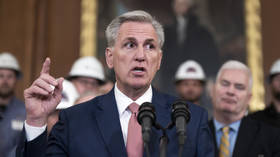
Beijing condemned the upcoming sit-down as a “disastrous” mistake and vowed to retaliate

US House Speaker Kevin McCarthy talks to reporters at the Capitol in Washington, DC, March 30, 2023. © AP / J. Scott Applewhite
US House Speaker Kevin McCarthy will meet with Taiwanese leader Tsai Ing-wen in California later this week, his office said in a statement. China has repeatedly urged against the sit-down, saying it would take tough countermeasures in response.
McCarthy confirmed the meeting in a media release on Monday, saying he would host a “bipartisan” event with Tsai at the Ronald Reagan Presidential Library in California on April 5. Other lawmakers are also set to make an appearance, including Democratic Rep. Pete Aguilar and leaders of the House select committee on China, according to an invite list obtained by CNN.
Taiwan’s presidential office also said the event with McCarthy would go ahead, after previous reports suggested Tsai would meet with the top US representative on her way home from a visit to Latin America, the island’s official Central News Agency reported. On the first leg of her trip, Tsai also stopped in New York, where she accused China of “deliberately” escalating tensions with the US and Taiwan.

While some Taiwanese officials have described Tsai’s trip to the US as a mere “transit” on her way to Guatemala and Belize, Beijing’s consulate in Los Angeles insisted she was engaged in official exchanges with US lawmakers and putting on a “political show.”
The meeting with McCarthy “is not conducive to regional peace, security nor stability, and is not in the common interests of the people of China and the United States,” the consulate told Reuters, adding that the House speaker “will undoubtedly repeat disastrous past mistakes and further damage Sino-US relations.”
Asked about the upcoming sit-down, the Chinese Foreign Ministry said “we strongly oppose any form of official interaction and contact between the US side and Taiwan authorities” and would “take resolute measures” in response. It did not specify exactly how it would retaliate, however.
While Taiwan has been self-governed since the end of the Chinese Civil War in 1949, Beijing considers the island as part of its sovereign territory, and has said it retains the right to reclaim the land by force if necessary. The United States does not recognize Taiwan as an independent state, though it continues various forms of contact with Taipei, including periodic visits by lawmakers. Last year, a trip to the island by then-House Speaker Nancy triggered unprecedented Chinese military drills in the airspace and waters around Taiwan, including an exercise simulating a full-on blockade.




